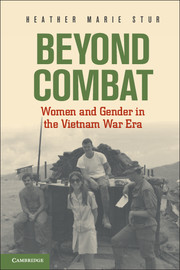Book contents
2 - “She Could Be the Girl Next Door”
The Red Cross SRAO in Vietnam
Published online by Cambridge University Press: 05 June 2012
Summary
One night in the spring of 1968, Dorothy Patterson and a couple of her fellow Red Cross volunteers convinced some GIs who had access to a jeep to drive them to Sin City. Located in An Khe, about a mile from where Patterson's Red Cross unit was stationed, Sin City was “a place where prostitutes and bar girls prospered” on the dollars and desires of U.S. soldiers. In polite terms, Sin City was a cluster of rinky-dink establishments where GIs could go to enjoy live music and dancing, drink beer, and sample local cuisine. In reality, many went to spend time with Vietnamese women in the privacy of a “boom-boom parlor,” local parlance for a room in a brothel. Sin City was surrounded by a barbed-wire fence and guarded by U.S. military police. Division commanders cooperated with local Vietnamese pimps to ensure that brothels provided the desired services to U.S. troops. Military medics, hoping to prevent the spread of venereal disease among the troops, subjected the Vietnamese women who worked there to regular examinations.
There was no written rule that forbade American women from visiting Sin City, but when U.S. servicemen saw Patterson and her friends at a café there, they flashed looks that made the women feel as though they were not welcome. “These GIs walk by on their way to the back room, and they were really almost indignant that we were there, wanted to know what we were doing there,” Patterson recalled. “They didn't want us to see them messing around with the Vietnamese women. I just got the feeling that they were embarrassed to think that we might see them.” Sin City, she noted, was “a place for GIs to go to be with a female” – a Vietnamese female.
- Type
- Chapter
- Information
- Beyond CombatWomen and Gender in the Vietnam War Era, pp. 64 - 104Publisher: Cambridge University PressPrint publication year: 2011



